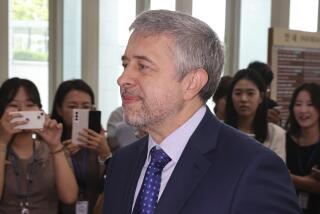North Korea says U.S. will ‘pay dearly’ for new U.N. sanctions

The sanctions include a ban on coal and other exports worth over $1 billion. (Aug. 7, 2017)
Reporting from Beijing — North Korean state media said Monday that the United States will “pay dearly” for a round of strict sanctions approved by the United Nations over the weekend, suggesting that Pyongyang remains committed to its nuclear ambitions and willing to bear the economic costs.
“There is no bigger mistake than the United States believing that its land is safe across the ocean,” the isolated country’s state-run Korean Central News Agency said in a statement.
The United Nations Security Council on Saturday voted on a new round of sanctions targeting North Korea’s primary exports, including iron, coal and seafood — together worth about $1 billion — in retaliation for its repeated missile tests.
Pyongyang has tested 14 missiles so far this year, including two intercontinental ballistic missiles in July, showcasing its technical ability to launch a strike on parts of the U.S., including Alaska, Los Angeles and Chicago.
The sanctions could slash North Korea’s annual export revenue, totaling an estimated $3 billion, by more than a third, according to a statement from the office of Nikki Haley, the U.S. ambassador to the United Nations.
President Trump, on Twitter, called the resolution the “single largest economic sanctions package ever on North Korea.”
Yet North Korea’s statement Monday illustrates the degree to which Kim Jong Un, the country’s ruler, prizes the country’s nuclear and missile programs as crucial deterrents against the United States and points of national pride.
“This U.N. ‘sanctions resolution,’ to all intents and purposes, is an outcome of diabolical attempts of the U.S. to isolate and stifle the DPRK,” the news agency said, using the initials of the country’s official name, the Democratic People’s Republic of Korea. The U.S. “is trying to drive the situation of the Korean peninsula to the brink of nuclear war,” it said.
Secretary of State Rex Tillerson, speaking to reporters at a regional conference in Manila on Monday, said the U.S. would be willing to discuss denuclearization with North Korea “when conditions are right.”
“The best signal that North Korea could give us that they’re prepared to talk would be to stop these missile launches,” he said.
South Korean President Moon Jae-in — another supporter of the latest sanctions — has also signaled a willingness to talk.
In a phone call with Trump on Sunday evening, Moon “affirmed that North Korea poses a grave and growing direct threat to the United States, South Korea and Japan, as well as to most countries around the world,” according to the White House.
North Korea’s top diplomat, Ri Yong Ho, also attended the Manila conference. Rather than address reporters, his spokesman distributed a transcript of a speech that Ri had delivered earlier in which he said that North Korea doesn’t intend to use nuclear weapons against any country “except the U.S.”
North Korea is “ready to teach the U.S. a severe lesson with its nuclear strategic force,” Ri said, according to the Associated Press.
Trump has leaned heavily on China to curb North Korea’s nuclear ambitions. Although China voted for the resolution Saturday, it has warned that sanctions alone will not dampen Pyongyang’s resolve.
“Sanctions are necessary but in no way the ultimate purpose,” China’s Foreign Minister Wang Yi said Monday at the Assn. of Southeast Asian Nations Summit, the conference in Manila. “Imposing fresh sanctions is aimed at bringing the conundrum back to the negotiation table.
“We would like to urge other parties like the United States and South Korea to stop increasing tensions,” he said.
The U.N.’s latest sanctions crack down on other sources of hard currency for Pyongyang; they target North Korean banks and ban joint ventures with North Korean companies.
Yet whether the sanctions will be effective remains unclear. China has already cut coal imports from North Korea until the end of the year, and North Korean state-run companies have proved adept at exporting other commodities, despite harsh international sanctions.
The resolution “is being oversold and is unlikely to produce the kind of economic damage that its sponsors are advertising,” Joseph DeThomas, a professor at the Pennsylvania State University School of International Affairs, wrote on 38 North, a respected North Korea-monitoring website.
“Moreover, it opens new doors for successful evasion, which in the current environment — with a volatile U.S. administration and high public alarm — could easily lead to sudden movements towards very dangerous overreactions.”
Analysts say North Korea is preparing to conduct its sixth nuclear test, and could soon have the capability to fit a miniaturized nuclear weapon onto a long-range missile.
North Korea “apparently views being able to threaten the U.S. mainland with a nuclear counterstrike as the ultimate deterrent,” Siegfried S. Hecker, a former director of the Los Alamos National Laboratory who has visited North Korea several times, told the Bulletin of the Atomic Scientists on Monday.
“It also likely has a political goal, to get Washington to the table on what Pyongyang would see as a more equal basis.”
ALSO
‘China has conquered Kenya’: Inside Beijing’s new strategy to win African hearts and minds
Philippine police killed a mayor and much of his family. Was it a raid gone wrong, or a massacre?
Pence’s sensitivity to talk of 2020 speaks to White House insecurity
UPDATES:
6:25 p.m.: This article was updated with comments from analysts and North Korea’s top diplomat.
9:55 a.m.: This article was updated throughout with Times reporting.
This article was originally published at 4:45 a.m.
More to Read
Sign up for Essential California
The most important California stories and recommendations in your inbox every morning.
You may occasionally receive promotional content from the Los Angeles Times.










